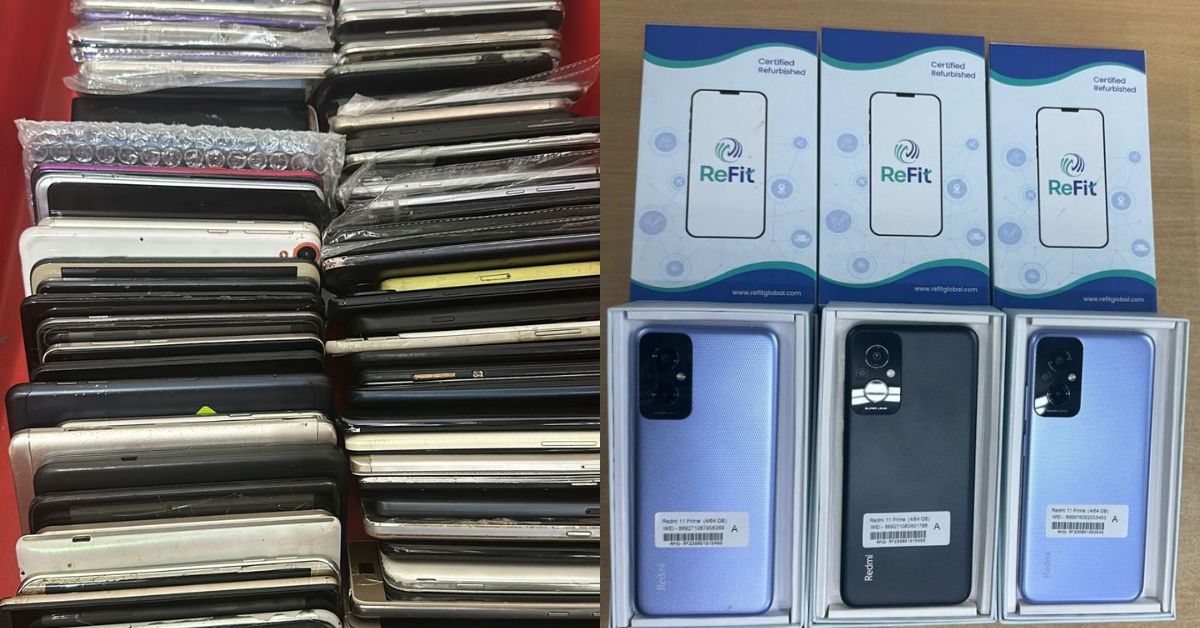There’s a new smartphone being launched almost every month. It feels like the next iteration of your current phone hits the market within a year of your purchase. Phone companies and marketplaces tantalise you with enticing exchange offers, tempting you to upgrade. But have you ever paused to consider what becomes of your old phones?
Many marketplaces and stores provide the option of purchasing a refurbished phone. Such a phone undergoes thorough inspection for defects, repairs, and replacement of faulty parts. According to a report by Redseer Strategy Consultants, the refurbished or used smartphone market in India is projected to soar to $10 billion by 2026.
In 2015, Avneet Singh set out to buy an iPhone for his mother but found the new phone’s price beyond his budget when he visited a store with his friend, Saket Saurav. However, an enterprising salesman offered them a second-hand phone at a significantly lower price, nearly Rs 35,000 less than a new one.
Despite the tempting offer, the phone lacked any checks and came without a warranty. Opting against the risky purchase, Avneet was inspired by the experience.
Working together at Shopclues, he and Saket recognised a problem worth solving. Subsequently, Shopclues introduced a refurbished mobile category, ReNew, which quickly generated multi-crore revenue within its first month.
They did extensive research on the refurbished mobile market and spotting an opportune time in May 2017, they quit their jobs and launched ReFit Global — a refurbished phone startup, on a mission to reduce e-waste by recycling and refurbishing second-hand gadgets.
ReFit is on track to achieve a revenue of Rs 240 crore this financial year and prevent 55,000 to 65,000 phones from becoming e-waste every month.
Recycling e-waste, promoting a circular economy

The two Delhiites met through common friends and their friendship solidified after two sales stints together at LG and Shopclues. The aforementioned incident and subsequent launch of the ReNew portfolio at Shopclues alerted the two MBA graduates about the potential of the refurbished market.
They conducted market research and, while overseeing the ReNew portfolio, gained practical insights into the details of the category. They learned firsthand about sourcing inventory, refurbishing phones, and identifying potential sales channels.
Coming from service-class backgrounds, the duo had long-held aspirations of becoming entrepreneurs. Recognising a promising business opportunity and observing a significant market gap, they made the bold decision to pursue their dreams. They left behind their stable corporate careers to dive headfirst into the world of entrepreneurship.
They invested all their savings and the then 28-year-olds took a personal loan of Rs 15 lakh each and bootstrapped their business. With a total capital of Rs 55 lakh, they started ReFit Global in May 2017.
“The refurbished market was just picking up at that time. Up until then, we only had the option to buy new phones or second-hand phones. A second-hand phone didn’t have credibility. So we decided to offer quality checked and tested refurbished phones,” explains Saket (35), co-founder and CEO, ReFit Global, to The Better India.
The Delhi-based company was started with a team of seven including the two founders, and focused on the offline market. Initially, Saket and Avneet would load about 100 refurbished phones in their cars, set out to the market, and convince channel partners to buy these phones.
“We would visit different markets and be on the road for almost 10 days at a time in the initial days. We explained the product to the channel partners and asked them to trust us with a small amount of money. Educating consumers and partners was the first, challenging step,” says Avneet (35), co-founder and COO, ReFit Global.
They slowly found a few channel partners who invested anywhere between Rs 2 to 5 lakh, which kicked off the business of the enterprise.
The first two years were a whirlwind of sleepless nights for these entrepreneurs, fully committed to their venture. Saket remembers that at the start of their business, his wife was pregnant, while Avneet’s parents had just begun searching for a bride for him.
“We invested all our savings; it was ‘do or die’ for us. We had a strong belief that it would work, and worked hard. We took no days off and burnt the midnight oil. We focused on building a good offline base and educating our distributors while building partnerships with mobile brands and marketplaces to buy back old phones,” adds Saket.
Their efforts paid off as people started trusting their brand and their sales grew. In the first year of operations, they earned a revenue of Rs 8 crore.
A 47-point quality check

ReFit sources old phones from three channels — marketplaces like Amazon and Flipkart, mobile manufacturers like Samsung, Oppo, Vivo, and Apple, and large format retailers like Sangeetha, Poorvika, and Croma.
Once the phones reach their office, they are tested using ReFit’s in-house diagnostic application which has 47 quality check parameters. Saket says that within two and a half minutes, the application identifies what’s wrong with the phone. Their engineers then rectify and repair the phones, conducting further checks to see if the sensors and cameras are working properly.
Once the faults are fixed, the application is run again to check if it passes all quality checks. It is then sent either to offline partners or sold through their own website, which was launched in October 2023. They also offer a six-month warranty on their phones.
Their average selling price offline is Rs 6,000 and online is Rs 11,000. There is more demand for high-end phones online, say the founders.
They further share that they sell between 55,000 to 65,000 phones every month and have sold over 1.75 million phones to date. They claim that they’ve been profitable from the outset and have achieved a consistent 100 percent year-on-year growth. Their revenue reached Rs 187 crore last year and is projected to hit Rs 240 crore this year. Operating in over 100 cities, they have a network of more than 50,000 retailers.
The major difference between a second-hand and refurbished phone, explains Saket, is the quality and credibility. “There is no quality testing or checking done on a second-hand phone. We ensure that there is no problem with the phone and give you a warranty,” he says.
These phones are also beneficial for the environment as they extend the lifespan of gadgets and prevent them from contributing to waste. In 2022, the Waste Electrical and Electronic Equipment (WEEE) forum reported that 5.3 billion mobile phones would become waste in that year alone. Instead of recycling old phones, many people either keep them at home or discard them in bins.
However, these devices contain valuable materials like gold, copper, and silver, which, if recycled, can prevent the need for extracting precious minerals and help reduce carbon emissions.
ReFit also appeared on Shark Tank India Season 3 and secured a deal for Rs 2 crore from three ‘Sharks’ — Anupam Mittal, Vineeta Singh, and Amit Jain. Post their appearance on Shark Tank, they have received over 20,000 queries from retailers and distributors in just 10 days, say the elated founders, adding that they want to increase their online presence in the coming years.
From initially keeping their venture a secret from their families to establishing a company valued at Rs 200 crore, Avneet and Saket exemplify the power of hard work, seizing opportunities at the right time, and embodying the hustle culture.
“You need to be honest with yourself and your customers, work hard, and have the zeal to build a business. Don’t stick to a strategy; instead, be willing to redo things if something doesn’t work. We achieved our goals because our intent and passion were strong,” says Avneet.
Edited by Pranita Bhat
No comments:
Post a Comment